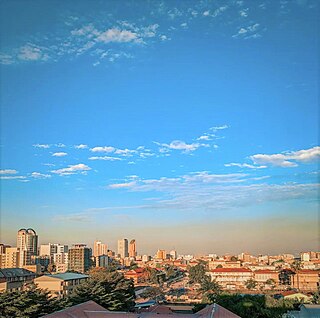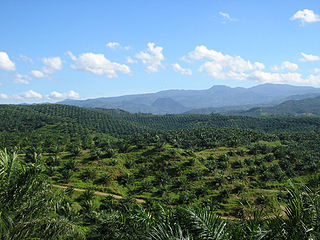
Palm oil is an edible vegetable oil derived from the mesocarp of the fruit of the oil palms. The oil is used in food manufacturing, in beauty products, and as biofuel. Palm oil accounted for about 36% of global oils produced from oil crops in 2014. Palm oils are easier to stabilize and maintain quality of flavor and consistency in ultra-processed foods, so are frequently favored by food manufacturers. On average globally, humans consumed 7.7 kg (17 lb) of palm oil per person in 2015. Demand has also increased for other uses, such as cosmetics and biofuels, creating more demand on the supply encouraging the growth of palm oil plantations in tropical countries.

Kisangani is the capital of Tshopo province in the Democratic Republic of the Congo. It is the fifth most populous urban area in the country, with an estimated population of 1,312,000 in 2021, and the largest of the cities that lie in the tropical woodlands of the Congo.

The Ituri conflict is an ongoing low intensity asymmetrical conflict between the agriculturalist Lendu and pastoralist Hema ethnic groups in the Ituri region of the north-eastern Democratic Republic of the Congo (DRC). While the two groups had fought since as early as 1972, the name 'Ituri conflict' refers to the period of intense violence between 1999 and 2003. Armed conflict continues to the present day.

Gombe, also known as La Gombe, or Downtown Kinshasa, is one of the 24 communes of Kinshasa, in the western part of the Democratic Republic of the Congo (DRC). Encompassing a vast area of approximately 29.33 square kilometers, it is home to an approximate population of 49,024 residents (2014).

Basankusu is a town in Équateur Province, Democratic Republic of the Congo. It is the main town and administrative centre of the Basankusu Territory. In 2004, it had an estimated population of 23,764. It has a gravel airstrip, covered and open markets, a hospital, and three cellphone networks, the first of which was installed in 2006. The town is also known as a centre for bonobo conservation efforts. Despite such developments, most inhabitants live at a subsistence level: hunting, fishing, keeping chickens and keeping a vegetable plot. In 2010, the workers at the local palm plantation would earn an average monthly salary of $40, most others would have much less.

Deutsche Investitions- und Entwicklungsgesellschaft (DEG) is a Development Finance Institution (DFI) and a subsidiary of KfW Group. It was founded in Cologne in September 1962 as a federally owned company by the former Federal President Walter Scheel. Since its foundation, DEG has been headquartered in Cologne. In 2008, DEG moved into a modern, energy efficient office building in the city centre. DEG has 20 representative offices across the world, inter alia in Bangkok, Beijing, Istanbul, Jakarta, Johannesburg, Lagos, Lima, Mexico City, Nairobi, New Delhi, São Paulo and Singapore. In 2021, DEG employed a staff of approximately 650, both in Germany and abroad. DEG generated new business totaling EUR 1.5 billion in 2021 and the balance sheet total amounted to EUR 5.328 billion. Since its foundation, DEG has co-financed almost 1,300 companies in more than 120 countries.
Palm oil, produced from the oil palm, is a basic source of income for many farmers in South East Asia, Central and West Africa, and Central America. It is locally used as cooking oil, exported for use in much commercial food and personal care products and is converted into biofuel. It produces up to 10 times more oil per unit area than soybeans, rapeseed or sunflowers.
Wilmar International Limited is a Singaporean food processing and investment holding company with more than 300 subsidiary companies. Founded in 1991, it is one of Asia's leading agribusiness groups alongside the COFCO Group. It ranks amongst the largest listed companies by market capitalisation on the Singapore Exchange (SGX), being the second largest as of September 2010. It was ranked 211th in the Fortune Global 500 list in 2020. It was ranked 3rd in the World's Most Admired Company by Fortune in 2019.

Deforestation in Indonesia involves the long-term loss of forests and foliage across much of the country; it has had massive environmental and social impacts. Indonesia is home to some of the most biologically diverse forests in the world and ranks third in number of species behind Brazil and the Democratic Republic of Congo.
The Compagnie du Kasai was a Belgian company established to exploit the resources of the Kasai River basin in the Congo Free State. At first it was mainly involved in harvesting wild rubber, but later moved into palm oil and mining.
Feronia Inc. is a multinational corporation that produces palm oil and other agricultural products in the Democratic Republic of the Congo while headquartered in Canada. In operation since 1911 as a large-scale commercial farmland and plantation operator in the Democratic Republic of the Congo (“DRC”), the Company used modern agricultural practices to operate and develop its oil palm plantations and arable farming business division. The company filed for bankruptcy in 2020 and was delisted from the TSX Venture Exchange.

Lubuk Pakam is a town in North Sumatra province of Indonesia and it is the seat (capital) of Deli Serdang Regency.

Palm oil production is important to the economy of Indonesia as the country is the world's biggest producer and consumer of the commodity, providing about half of the world's supply. In 2016, Indonesia produced over 34.6 million metric tons of palm oil, and exported 25.1 million metric tons of it. Oil palm plantations stretch across at least 12 million hectares. There are several different types of plantations, including small, privately owned plantations, and larger, state-owned plantations. There are a variety of health, environmental, and societal impacts that result from the production of palm oil in Indonesia. A recent publication by the NGO Rainforest Action Network (RAN) indicates that the use of palm oil by some of the biggest chocolate and snacks' producers is increasing this problem.
Equatorial Palm Oil plc (EPO) is a palm oil company from London, United Kingdom. It is listed on the Alternative Investment Market (AIM) of the London Stock Exchange. Equatorial Palm Oil plc was founded in 2005. Effective 20 December 2013, KL-Kepong International Ltd, a wholly owned unit of Kuala Lumpur Kepong Berhad acquired 63.181% interest in Equatorial Palm Oil PLC. Major brands including Kellogg's, Kraft Foods, Nestlé, Unilever, Procter & Gamble, and General Mills have been reported as direct or indirect consumers of KLK palm oil.
Alfred Lahai Gbabai Brownell is a Liberian environmental activist and lawyer. Brownell met international attention because of his advocacy to prevent the destruction of tropical forests for palm oil production. After receiving death threats as a result of his work, he and his family fled Liberia in 2016. He won the Goldman Environmental Prize, also called the "Green Nobel," in 2019 for his work protecting more than 500,000 acres (2,000 km2) of the tropical forest that were traditional lands of local communities.
Huileries du Congo Belge (HCB) was a subsidiary of the soap manufacturing company Lever Brothers, created by William Hesketh Lever, which ran plantations in the Congo for the production of palm oil, using forced labour. It was established in 1911, when the soap manufacturer received a concession from the Belgian government for 750,000 hectares of forest in the Belgian Congo, mostly south of Bandundu. By 1923, a Lever soap factory was built there, and by 1924 SAVCO was established. It was the nucleus of the United Africa Company, a principal supplier to the United Kingdom of several key commodities. From 1951 it was producing Lux soap.
SOCFIN Group, also known as the Société Financière des Caoutchoucs is a holding company listed on the Luxembourg Stock Exchange, it has direct and indirect interest in oil palm and rubber plantation operations and marketing of oil palm seeds in Asia and Africa. It is majority owned by the Bollore Group of France and the Hubert Fabri family of Luxembourg. The company operates in various countries through managing subsidiaries involved in joint ventures with governments and entrepreneurs. In 2018, it earned revenues from approximately 130,000 ha of palm oil plantations and 64,000 ha of rubber plantations.
Yangambi Biosphere Reserve is a protected area in the Democratic Republic of the Congo. It is located in Tshopo province.
'La Belgika was a trading company that was active in the Congo Free State and the Belgian Congo. It produced, processed and exported commodities such as rubber, palm oil and coffee, and imported basic goods needed by the local people, which it sold in a network of stores.

Katogota is a village located in the Itara-Luvungi grouping within the Bafuliiru Chiefdom in Uvira Territory of the South Kivu Province in the Democratic Republic of the Congo (DRC). Situated approximately 60 km south of Bukavu, Katogota is in close proximity to the Kamonyi and Rusagara villages, near the border regions of Rwanda and Burundi.









